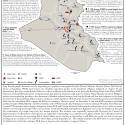 |
 |
Iraq Situation Report: August 31-September 6, 2016
Sep 6, 2016 - Emily Anagnostos


Iraqi Kurdish parties fractured over the impending no-confidence vote against Kurdish Finance Minister Hoshyar Zebari. The Patriotic Union of Kurdistan (PUK) and Gorran, two Kurdish opposition parties in the Kurdistan Alliance, indicated on August 30 and September 1 that they would dismiss Zebari in order to undermine the influence of his party, the Kurdistan Democratic Party (KDP). However, several PUK leaders have recognized both that Zebari’s dismissal could empower former Prime Minister Nouri al-Maliki to reclaim the premiership, possibly to the detriment of Kurdish political interests, and that the Kurds will lose their influence in the Iraqi Government if the Kurdistan Alliance fails to maintain a unified position. PUK Deputy Secretary Generals Kusrat Rasul and Barham Salih tried to consolidate PUK support for Zebari by creating a “decision center” on September 2, but anti-KDP members, including politburo leaders Mulla Bakhtiar and Hero Ibrahim, wife of PUK founder Jalal Talabani, resisted the attempt. President Fuad Masoum, a senior PUK member, and an Iranian delegation visited PUK and Gorran leaders in Suleimaniyah on September 4-6 in order to ensure Zebari’s survival and resolve the PUK’s internal issues. Continued Kurdish participation in Baghdad is necessary for stability in Iraq and the continuation of a single Iraqi state, key Iranian interests. The attempts were reportedly unsuccessful. However, the Council of Representatives (CoR) failed to reach quorum on September 6, precluding a no-confidence vote against Zebari. The CoR will reconvene September 8, however the upcoming Eid al-Ahda holiday recess, starting on September 9, will likely also result in a lack of quorum, moving any no-confidence vote until after the holiday, around September 27. The holiday could give the KDP time to secure support for Zebari from other blocs and give PUK time to improve party discipline to support Zebari.
Meanwhile, the National Alliance, the pan-Shi’a bloc in the CoR, selected Islamic Supreme Council of Iraq (ISCI) leader Ammar al-Hakim as its new chairman on September 5. The selection is likely an effort to revive the ineffectual Shi’a alliance, which fractured largely over the political maneuverings of the Reform Front, Maliki’s shadow party in the CoR, and PM Abadi’s attempts to reshuffle the Cabinet. Hakim succeeds Ibrahim al-Jaafari, who held the position for six years as the National Alliance remained deadlocked between electing Hakim or Ali al-Adeeb, a Maliki-backed candidate, as Jaafari’s successor. Hakim’s selection therefore indicates that Maliki was heavily pressured or incentivized to drop his case. Both Hakim and Maliki met with Iranian Ambassador to Iraq Hassan Danaifar on September 3 and 4, respectively, who likely passed on Iran’s insistence that the Shi’a parties reunite and that Maliki stand down on his refusal to support Hakim for the position. A fractured Iraqi Shi’a alliance could promote increased instability, limiting Iran’s influence in Iraq. Political parties, including both Kurdish and Sunni parties, have praised Hakim’s selection, as he is regarded as a mediator figure. A unified National Alliance could provide a stabilizing effect for the Iraqi political system which has rapidly deteriorated since April. However, it remains to be seen how Maliki and the Reform Front will respond to the National Alliance’s revitalization and whether or not the National Alliance will be able to unite Shi’a political parties in the CoR. Hakim may use the Eid al-Ahda recess to realign the Shi’a parties and to mediate ongoing crises amongst the Kurdish and Sunni parties in order to stabilize the government.